#journey to God
Explore tagged Tumblr posts
Photo

“We are profoundly not alone. A great cloud of witnesses cheers us on as we journey with them towards the fulfillment of all things in the hands of God.”
~Fr. Stephen Freeman
(Image via facebook)
#Orthodox Christian#cloud of witnesses#saints#Lord Jesus Christ#journey to God#we are profoundly not alone#support#encouragement
433 notes
·
View notes
Text
Ares after witnessing what happened in "Odysseus" (Athena was right was right about making people bleed):

(The Ares's design i used was made by @anniflamma !!!)
#artists on tumblr#art#digital art#artwork#epic the musical#fanart#epic the ithaca saga#ithaca saga#epic ithaca saga#epic musical#ares epic the musical#This was funny JOT to draw it lol#And i imagined all of the other gods are just watching everything go in the last saga#And then curse the Epic Crew's odyse- I MEAN journey to Ithaca and the stream haha
13K notes
·
View notes
Text

Quilt update. This is split somewhere in the blues and I have to sew that together and then I have to add one more yellow row to the top. Then the quilt top is finally, finally done.
#dear god this has been a journey#I started buying material and making hexagons out of circles last July so it’s been a year and some change#it’ll be over a year and a half by the time I’m finished probably because I’m spending October writing#so I’m waiting until November to find the time and space to actually quilt this thing#and im doing that entirely by hand too#I may bind it with my sewing machine though because holy hell#my quilt#quilt progress
5K notes
·
View notes
Text

“A thousand generations serve to praise…”
#listening to the 1996 ending and getting emotional at the last line#thinkin bout how even literally thousands of generations later we’re still making new adaptations of this guy#and still talking about everyone’s favorite lil monkey guy#and after all - isn’t that true immortality?#sun wukong#jttw sun wukong#journey to the west 1986#journey to the west 1996#havoc in heaven#monkey king#monkey king reborn#lego monkie kid#lmk sun wukong#lmk fanart#digital art#my art#journey to the west#I’ve been wanting to make a piece like this for a while#thank god for the symmetry tool…#I’ve been really locked into work lately so this was a relaxation piece#my only regret is that I didn’t have enough stamina to shade it#but I still like the vibrant colors a lot so it’s cool 👍#I ordered it by timeline#some of my favorite Wukongs :)
5K notes
·
View notes
Text

Kindly Miquella... I see you've thrown away... Something you should not have... Under any circumstances.
#elden ring#elden ring shadow of the erdtree#elden ring fanart#miquella#st trina#finished the dlc...perchance... i am gamer?#i really liked miquella as a villain or rather his journey into becoming one#loved that as a player you follow his traces and slowly come to realize that he's losing sight of who he was and what he was striving for#how can you save others if you cannot save yourself? god that old guy at the cross was asking the real questions
5K notes
·
View notes
Text

#universe#fate#destiny#have faith#trust#faith in the universe#quotes#spiritual#inspiration#life#soul#spiritualgrowth#spirituality#new age#spiritual community#trust god#buy trustpilot reviews#spiritual awakening#spiritual awareness#spiritual development#spiritual healing#spiritual journey#spiritualguidance#spiritual warfare#motivational#motivation#growth mindset#consciousness#higher consciousness
2K notes
·
View notes
Text
i enjoy looking at promotional photos of the Tenth Doctor in series 2 and 4 side by side because you can clearly see the changes he goes through. from joyful and optimistic to sorrowful and arrogant, hardened by all the loses he has suffered. it's a brilliant visual representation of his character arc


#a little guy becoming a god#it's great that david tennant aged a bit while playing the role because it fits the character's journey perfectly#doctor who#tenth doctor#time lord victorious#david tennant#myposts
2K notes
·
View notes
Text

your love returns in tragedy (ID in alt)
#farcille#falin touden#marcille donato#dungeon meshi#dunmeshi#coming face to face with the consequences of acting out of love - marcille u will always be famous#dunmeshi is really a series that keeps on moving bc it's about so many different characters and centered on the journey#rather than like... introspectively on one singular individual so i dont think we see marcille dwell on it but we can see her fatigue#her shock and surprise in the recent ep “don't hurt her she's just confused” Gah. desperately trying to grasp everything thats going on and#not to lose hope. bc undoubtedly the remains she put together was falin's - that short moment of reprieve the party had was with falin#she was able to bring her back her magic did it!! but the violence the fatal swings was not falin at all.#just pondering about holding that guilt... it's such a huge responsibility to be in charge of life in the first place and yet it is#a burden she'll keep trudging with. defying the natural orders to keep the people she love alive... i Lauv her...#also shared sentiment with the rest of the fandom but God. Chimera Falin... she is Everything....#ruporas art
6K notes
·
View notes
Text
So You Want to Read More about Chinese Mythos: a rough list of primary sources
"How/Where can I learn more about Chinese mythology?" is a question I saw a lot on other sites, back when I was venturing outside of Shenmo novel booksphere and into IRL folk religions + general mythos, but had rarely found satisfying answers.
As such, this is my attempt at writing something past me will find useful.
(Built into it is the assumption that you can read Chinese, which I only realized after writing the post. I try to amend for it by adding links to existing translations, as well as links to digitalized Chinese versions when there doesn't seem to be one.)
The thing about all mythologies and legends is that they are 1) complicated, and 2) are products of their times. As such, it is very important to specify the "when" and "wheres" and "what are you looking for" when answering a question as broad as this.
-Do you want one or more "books with an overarching story"?
In that case, Journey to the West and Investiture of the Gods (Fengshen Yanyi) serve as good starting points, made more accessible for general readers by the fact that they both had English translations——Anthony C. Yu's JTTW translation is very good, Gu Zhizhong's FSYY one, not so much.
Crucially, they are both Ming vernacular novels. Though they are fictional works that are not on the same level of "seriousness" as actual religious scriptures, these books still took inspiration from the popular religion of their times, at a point where the blending of the Three Teachings (Buddhism, Daoism, Confucianism) had become truly mainstream.
And for FSYY specifically, the book had a huge influence on subsequent popular worship because of its "pantheon-building" aspect, to the point of some Daoists actually putting characters from the novel into their temples.
(Vernacular novels + operas being a medium for the spread of popular worship and popular fictional characters eventually being worshipped IRL is a thing in Ming-Qing China. Meir Shahar has a paper that goes into detail about the relationship between the two.)
After that, if you want to read other Shenmo novels, works that are much less well-written but may be more reflective of Ming folk religions at the time, check out Journey to the North/South/East (named as such bc of what basically amounted to a Ming print house marketing strategy) too.
-Do you want to know about the priestly Daoist side of things, the "how the deities are organized and worshipped in a somewhat more formal setting" vs "how the stories are told"?
Though I won't recommend diving straight into the entire Daozang or Yunji Qiqian or some other books compiled in the Daoist text collections, I can think of a few "list of gods/immortals" type works, like Liexian Zhuan and Zhenling Weiye Tu.
Also, though it is much closer to the folk religion side than the organized Daoist side, the Yuan-Ming era Grand Compendium of the Three Religions' Deities, aka Sanjiao Soushen Daquan, is invaluable in understanding the origins and evolutions of certain popular deities.
(A quirk of historical Daoist scriptures is that they often come up with giant lists of gods that have never appeared in other prior texts, or enjoy any actual worship in temples.)
(The "organized/folk" divide is itself a dubious one, seeing how both state religion and "priestly" Daoism had channels to incorporate popular deities and practices into their systems. But if you are just looking at written materials, I feel like there is still a noticeable difference.)
Lastly, if you want to know more about Daoist immortal-hood and how to attain it: Ge Hong's Baopuzi (N & S. dynasty) and Zhonglv Chuandao Ji (late Tang/Five Dynasties) are both texts about external and internal alchemy with English translations.
-Do you want something older, more ancient, from Warring States and Qin-Han Era China?
Classics of Mountains and Seas, aka Shanhai Jing, is the way to go. It also reads like a bestiary-slash-fantastical cookbook, full of strange beasts, plants, kingdoms of unusual humanoids, and the occasional half-man, half-beast gods.
A later work, the Han-dynasty Huai Nan Zi, is an even denser read, being a collection of essays, but it's also where a lot of ancient legends like "Nvwa patches the sky" and "Chang'e steals the elixir of immortality" can be first found in bits and pieces.
Shenyi Jing might or might not be a Northern-Southern dynasties work masquerading as a Han one. It was written in a style that emulated the Classics of Mountains and Seas, and had some neat fantastic beasts and additional descriptions of gods/beasts mentioned in the previous 2 works.
-Do you have too much time on your hands, a willingness to get through lot of classical Chinese, and an obsession over yaoguais and ghosts?
Then it's time to flip open the encyclopedic folklore compendiums——Soushen Ji (N/S dynasty), You Yang Za Zu (Tang), Taiping Guangji (early Song), Yijian Zhi (Southern Song)...
Okay, to be honest, you probably can't read all of them from start to finish. I can't either. These aren't purely folklore compendiums, but giant encyclopedias collecting matters ranging from history and biography to medicine and geography, with specific sections on yaoguais, ghosts and "strange things that happened to someone".
As such, I recommend you only check the relevant sections and use the Full Text Search function well.
Pu Songling's Strange Tales from a Chinese Studios, aka Liaozhai Zhiyi, is in a similar vein, but a lot more entertaining and readable. Together with Yuewei Caotang Biji and Zi Buyu, they formed the "Big Three" of Qing dynasty folktale compendiums, all of which featured a lot of stories about fox spirits and ghosts.
Lastly...
The Yuan-Ming Zajus (a sort of folk opera) get an honorable mention. Apart from JTTW Zaju, an early, pre-novel version of the story that has very different characterization of SWK, there are also a few plays centered around Erlang (specifically, Zhao Erlang) and Nezha, such as "Erlang Drunkenly Shot the Demon-locking Mirror". Sadly, none of these had an English translation.
Because of the fragmented nature of Chinese mythos, you can always find some tidbits scattered inside history books like Zuo Zhuan or poetry collections like Qu Yuan's Chuci. Since they aren't really about mythology overall and are too numerous to cite, I do not include them in this post, but if you wanna go down even deeper in this already gigantic rabbit hole, it's a good thing to keep in mind.
#chinese mythology#chinese folklore#resources#mythology and folklore#journey to the west#investiture of the gods
2K notes
·
View notes
Text
20 reasons to read your Bible:
To grow in Christ (2 Peter 3:18)
To learn wisdom (Proverbs 4:5)
To be equipped (2 Timothy 3:17)
To teach others (Colossians 3:16)
To know God's will (Romans 12:2)
To find comfort (2 Corinthians 1:3)
To give praise to God (Psalm 56:4)
To hope in His promises (Titus 1:2)
To walk in His ways (Psalm 119:105)
To be sanctified in truth (John 17:17)
To turn away from sin (Psalm 119:11)
To love all the more (Philippians 1:9)
To receive instruction (Romans 15:4)
To listen to correction (2 Timothy 4:2)
To pray more effectively (Matthew 6:9)
To remember the gospel (2 Timothy 2:8)
To remain disciplined (1 Corinthians 9:27)
To look forward to heaven (Colossians 3:1)
To have the mind of Christ (Philippians 2:5)
To keep your eyes upon Jesus (Hebrews 12:2)
#bible verse#bible#bible study#bible scripture#scripture#self reflecting#self journey#self healing#self reflection#self love#self care#spiritual journey#spirituality#holy spirit#god#jesus
763 notes
·
View notes
Text

me and my nonsense medieval fantasy fantasies against the world
#my art#termina#fear and hunger fanart#fear and hunger termina#funger#fear and hunger marina#fear and hunger samarie#elves#this sword from the game is so freaking cool#f&h termina#f&h2#marinas journey to become god princess tale of love and friendship#actually this is an au if they were in shrek. sometimes i ponder this topic#what characters would fit in the world of shrek who is shrek-able And actually almost everything can fit in shrek#so its them as imaginary fairytale characters in shrek movies
715 notes
·
View notes
Text

Shithead number 1 and shithead number 2
#monkey king reborn#nezha 2019#nezha#sun wukong#donghua#fanart#crossover#that fucking dog that I hate#journey to the west#investiture of the gods#what is this creature called
2K notes
·
View notes
Text
you get assigned gay by kenny ortega. you then get assigned not gay by disney but they let you keep the fruity hats. you come back next year and get assigned gay by kenny ortega again, this time complete with a homoerotic dance sequence. you return again the following year and are assigned not gay by disney, this time accompanied by a heterosexual prom date. you return 15 years later and are finally assigned gay by disney because they now think it's profitable. you are ryan evans in high school musical.
#gay people ARE real oh my god#this has been a journey#kenny ortega lucas grabeel thank you for your service#high school musical#hsmtmts#hsmtmts spoilers#ryan evans#**
6K notes
·
View notes
Text

God's sleepiest soldier reporting for duty!
#frieren#sousou no frieren#frieren at the funeral#frieren: beyond journey's end#anime#god's sleepiest soldier
1K notes
·
View notes
Text

Mama a monkey behind you
#he’s making that goddamn face again isn’t he#I don’t even have to turn around I know he’s got that stupid look again#can take the monkey outta the huaguoshan but you can’t take the huaguoshan outta the monkey#if you thought I was putting effort into this you’re funny#digital art#my art#journey to the west#jttw sun wukong#jttw tripitaka#xuanzang#journey to the west fanart#sun wukong#throwing my hat into the meme ring lol#I had this in my drafts and then when I went into em for unrelated purposes I burst out laughing#cuz I forgot how stupid he looks 😭#make no mistake bajie and wujing do this too I just didn’t feel like drawing them in im sorry y’all#xuanzang and his three stoopid sons#xuanzang: the gods have blessed us with this life giving rain 😌🙏#wukong: aaaaaaaaaaa 👁️👅👁️
874 notes
·
View notes
Text
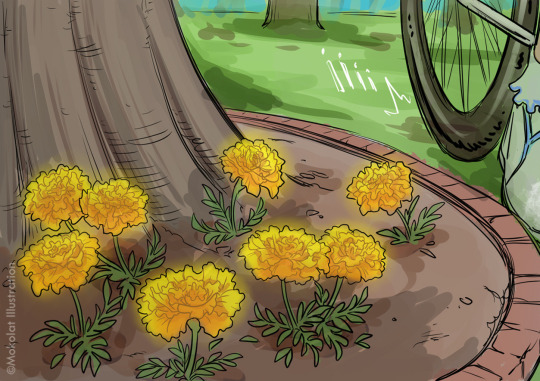
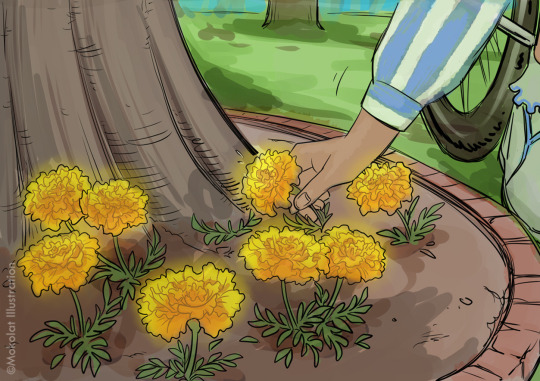



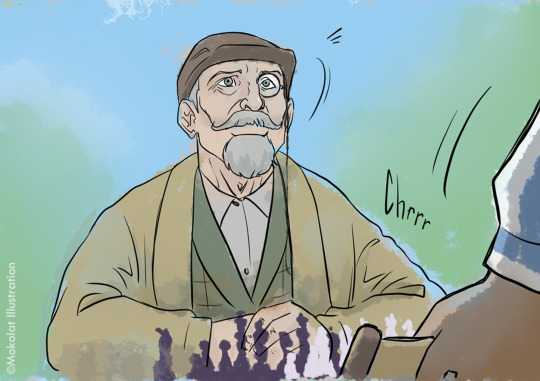





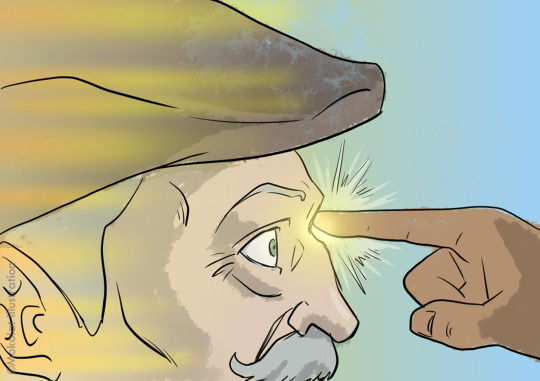


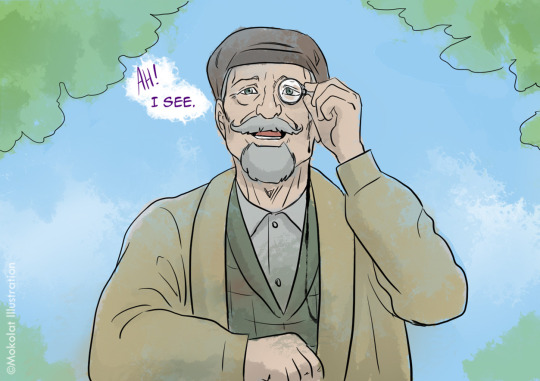


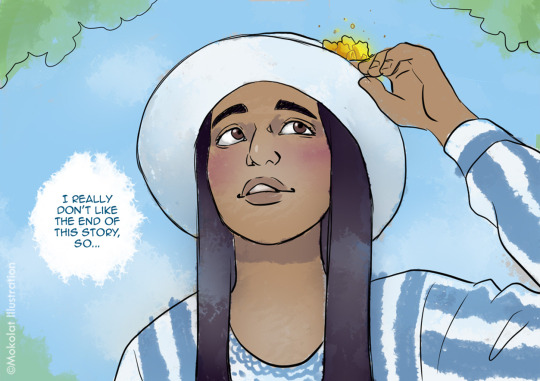
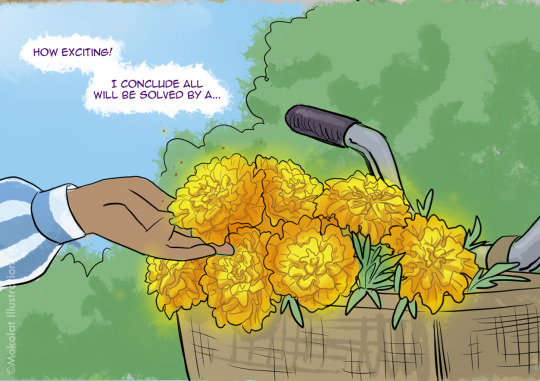




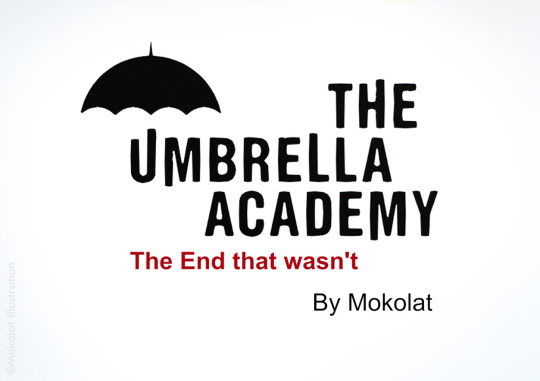
#“I really don't like the end of this story so...”#theumbrellaacademy#tua#Mokolat#fanart#reginaldhargreeves#colm feore#abigaihargreeves#liisa repo-martell#the girl on the bike#birva pandya#spoiler#tua s4#tua s4 spoilers#So! I see TUA finale. I have no words.#I was 😶#just 😶#Anyway! I don't like to complain#And prefer to confort myself with my own ending!#And confort you too I hope ♥#Take this as a post-post-credit scene#There was SO much potential to end this serie!#Let's solve this story by a#DEUS EX MACHINA#(~Or a Klaus journey on Lil' God's hat~)#If you have to rewatch TUA always remember there is a lil Godness somewhere ♥#Also in my imagination the Lil' God's Marigold awake all the Hargreeves somewhere in 2019 or 2024#With their memories and famillies and missing peoples ♥ and probably new silly troubles too~
809 notes
·
View notes